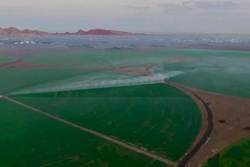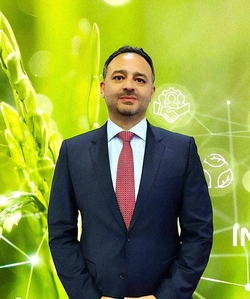Zawya | October 25, 2023
UAE's EAP plans multimillion-dollar wheat farm project in Ethiopia, tea factory in Uganda
Negotiations in progress for a wheat farm project in Ethiopia with a rough estimated value of $200mln
Sona Nambiar, Zawya Projects
Elite Agro Projects (EAP), a UAE-headquartered specialist agricultural engineering, procurement and construction (EPC) company, plans to establish a wheat farm in Ethiopia and a tea factory in Uganda, its senior executive said.
Hassan Halawy, General Manager, EAP, told Zawya Projects that the company is studying establishing a wheat farm in Ethiopia due to the rising demand for the grain.
The proposed project would involve an agreement with the local government to export part of the harvest to the UAE and sell the rest locally in Ethiopia.
"We are still working on the estimations and value-engineering of the yet-undisclosed mega project," Halawy said in an exclusive interview, adding that EAP currently operates a flower farm in Ethiopia.
On the other hand, the company's tea factory project in Uganda would improve the livelihood of farmers by increasing the farm gate price of their products.
The EAP executive explained: "Instead of going and investing in farms and competing with the local farmers, we will develop agro-processing facilities and create agreements where we can off-take their products and improve their livelihood and wages. At the same time, we can sell their products in our markets."
He said it was too early to reveal the project values.
However, a source familiar with the wheat farm project, who preferred to remain unnamed, told Zawya Projects that a rough estimated value of the development is $200 million, but the value could change over time.
The pay-off
EAP is mainly involved in the design and execution of open field as well as CEA (controlled environment agriculture) projects that require varying levels of technology - low, medium or high, - in addition to associated agro-processing facilities and cold chain infrastructure.
The company was set up four years ago as the development arm of Elite Agro Holding, established in 2008 as a subsidiary of the UAE-headquartered investment company Yas Holding.
Halawy said: "We decided to offer a specialised one-stop-shop for investors and family offices looking to venture into the agricultural sector and provide them with feasible and commercially viable studies based on their initial inputs, location and vision. This includes aspects such as land concession, investment budget or off-take agreements."
The decision paid off, with EAP successfully designing and delivering projects worth AED800 million ($218 million) since inception, he noted.
Many firsts
Currently, the company is working on agricultural projects in the UAE and Saudi Arabia.
Halawy said: "We recently won the development of the first open field project with NEOM in Saudi Arabia, where we will design and execute a 25-hectare table grapes farm. The engineering works have begun, and the farm will be ready in one year."
Last year, the company successfully executed the initial phase of the Saba Sanabel [seven spikes in Arabic] wheat farm project in Mleiha, Sharjah, which Sheikh Dr Sultan Al Qasimi, Supreme Council Member and Ruler of Sharjah, inaugurated.
"This year, we are working on the expansion in two phases. We are adding 1,000 hectares, which will be handed over by the end of this month (October 2023). It was built in a record time of 45 days to catch the next season in 2023-2024," he said.
According to a March 2023 report by state news agency WAM, the project aims to harvest 15,200 tonnes of wheat, equal to Sharjah's annual consumption. The sowing for the 400-acre Phase 1 was done in November 2022, with the produce harvested in March 2023.
Halawy said the company has also successfully built an Arabica coffee farm for a VIP Dubai client in a regular greenhouse without chillers, a global first.
"It is known that Arabica coffee only grows at a certain altitude and a certain cold temperature in the coffee belt around the world," he said,
EAP achieved the client's vision through serious engineering and breakthrough technologies that mimicked the natural living conditions of the plant, he added.
Previously, the company worked on a rural development project in Liberia with the Food and Agricultural Organisation (FAO). "They came to us with several problems faced by small farmers living in remote areas. We designed a solar-operated containerised unit with an advanced irrigation system and cold storage to support the family's livelihood," he said.
Additionally, EAP designed and executed a smart portal, which connected its technical team with all the functions in the container. "This way, we could provide agriculture extension services for the farmers," he added.
Future projects
Halawy said the company has a two-year pipeline of CEA projects in the UAE.
He elaborated: "We are concentrating mostly on the medium-tech retractable roof net houses because we believe that they are more sustainable; they consume less water and electricity with a lower carbon footprint than chilled greenhouses."
"However, we might also work on some chilled greenhouses with certain produce to fill the summer gap - the ratio is 85/15 between medium-tech and high-tech."
Halawy said his own estimates indicate the UAE agritech market will reach AED500 million ($136 million) in the coming year.
(Reporting by Sona Nambiar; Editing by Anoop Menon)
([email protected])
UAE's EAP plans multimillion-dollar wheat farm project in Ethiopia, tea factory in Uganda
Negotiations in progress for a wheat farm project in Ethiopia with a rough estimated value of $200mln
Sona Nambiar, Zawya Projects
Elite Agro Projects (EAP), a UAE-headquartered specialist agricultural engineering, procurement and construction (EPC) company, plans to establish a wheat farm in Ethiopia and a tea factory in Uganda, its senior executive said.
Hassan Halawy, General Manager, EAP, told Zawya Projects that the company is studying establishing a wheat farm in Ethiopia due to the rising demand for the grain.
The proposed project would involve an agreement with the local government to export part of the harvest to the UAE and sell the rest locally in Ethiopia.
"We are still working on the estimations and value-engineering of the yet-undisclosed mega project," Halawy said in an exclusive interview, adding that EAP currently operates a flower farm in Ethiopia.
On the other hand, the company's tea factory project in Uganda would improve the livelihood of farmers by increasing the farm gate price of their products.
The EAP executive explained: "Instead of going and investing in farms and competing with the local farmers, we will develop agro-processing facilities and create agreements where we can off-take their products and improve their livelihood and wages. At the same time, we can sell their products in our markets."
He said it was too early to reveal the project values.
However, a source familiar with the wheat farm project, who preferred to remain unnamed, told Zawya Projects that a rough estimated value of the development is $200 million, but the value could change over time.
The pay-off
EAP is mainly involved in the design and execution of open field as well as CEA (controlled environment agriculture) projects that require varying levels of technology - low, medium or high, - in addition to associated agro-processing facilities and cold chain infrastructure.
The company was set up four years ago as the development arm of Elite Agro Holding, established in 2008 as a subsidiary of the UAE-headquartered investment company Yas Holding.
Halawy said: "We decided to offer a specialised one-stop-shop for investors and family offices looking to venture into the agricultural sector and provide them with feasible and commercially viable studies based on their initial inputs, location and vision. This includes aspects such as land concession, investment budget or off-take agreements."
The decision paid off, with EAP successfully designing and delivering projects worth AED800 million ($218 million) since inception, he noted.
Many firsts
Currently, the company is working on agricultural projects in the UAE and Saudi Arabia.
Halawy said: "We recently won the development of the first open field project with NEOM in Saudi Arabia, where we will design and execute a 25-hectare table grapes farm. The engineering works have begun, and the farm will be ready in one year."
Last year, the company successfully executed the initial phase of the Saba Sanabel [seven spikes in Arabic] wheat farm project in Mleiha, Sharjah, which Sheikh Dr Sultan Al Qasimi, Supreme Council Member and Ruler of Sharjah, inaugurated.
"This year, we are working on the expansion in two phases. We are adding 1,000 hectares, which will be handed over by the end of this month (October 2023). It was built in a record time of 45 days to catch the next season in 2023-2024," he said.
According to a March 2023 report by state news agency WAM, the project aims to harvest 15,200 tonnes of wheat, equal to Sharjah's annual consumption. The sowing for the 400-acre Phase 1 was done in November 2022, with the produce harvested in March 2023.
Halawy said the company has also successfully built an Arabica coffee farm for a VIP Dubai client in a regular greenhouse without chillers, a global first.
"It is known that Arabica coffee only grows at a certain altitude and a certain cold temperature in the coffee belt around the world," he said,
EAP achieved the client's vision through serious engineering and breakthrough technologies that mimicked the natural living conditions of the plant, he added.
Previously, the company worked on a rural development project in Liberia with the Food and Agricultural Organisation (FAO). "They came to us with several problems faced by small farmers living in remote areas. We designed a solar-operated containerised unit with an advanced irrigation system and cold storage to support the family's livelihood," he said.
Additionally, EAP designed and executed a smart portal, which connected its technical team with all the functions in the container. "This way, we could provide agriculture extension services for the farmers," he added.
Future projects
Halawy said the company has a two-year pipeline of CEA projects in the UAE.
He elaborated: "We are concentrating mostly on the medium-tech retractable roof net houses because we believe that they are more sustainable; they consume less water and electricity with a lower carbon footprint than chilled greenhouses."
"However, we might also work on some chilled greenhouses with certain produce to fill the summer gap - the ratio is 85/15 between medium-tech and high-tech."
Halawy said his own estimates indicate the UAE agritech market will reach AED500 million ($136 million) in the coming year.
(Reporting by Sona Nambiar; Editing by Anoop Menon)
([email protected])














